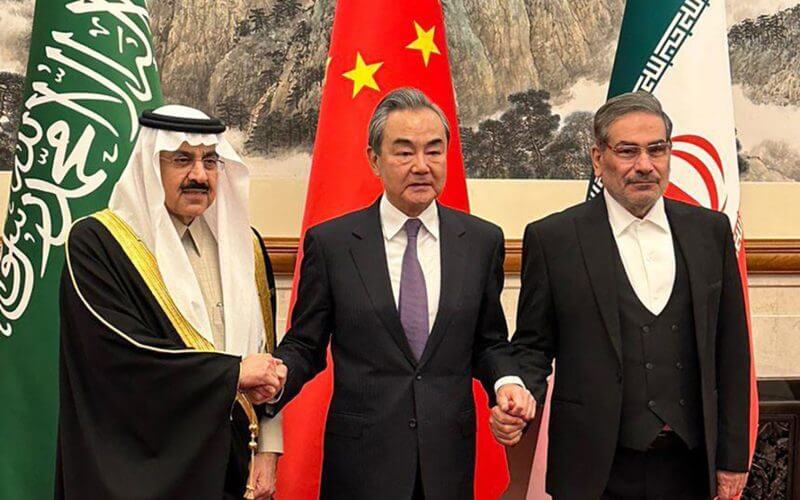On Friday, the Islamic Republic of Iran (IRI) and the Kingdom of Saudi Arabia (KSA) agreed to re-establish diplomatic ties after several years of bitter rivalry in a pact brokered by the Chinese government. The diplomatic breakthrough between Tehran and Riyadh comes as the Communist government in China and the Islamic Republic continue to spread their influence in the Middle East, worrying American, Arab, and Israeli officials.
According to multiple media reports, the deal was signed in Beijing this Friday amid China's National People's Congress ceremony. The move represents a significant diplomatic victory for Beijing as Persian Gulf Arab states like Saudi Arabia are turning toward new allies, after receiving the cold shoulder from President Biden and his administration, which seeks to withdraw American influence from the Middle East. It also comes as the Biden administration has and continues to vie for a nuclear agreement with Tehran, alleviating economic sanctions on the regime and delisting the Iranian-backed Houthi terrorist group from the Foreign Terrorist Organization (FTO) list.
“The Islamic Republic is the big winner in this summit and the United States the big loser,” said Dr. Walid Phares, a foreign policy analyst and author. His latest book, “An Imperialist Republic and U.S. Policy: Iran,” outlines the history of American foreign policy toward Tehran.
“China cornered the U.S. because the latter cannot say this is a bad move. Washington has to accept this deal and cannot reject, because it is about stabilizing the region and removing the trigger to wars. Biden was played by Xi,” Phares said.
According to videos on Islamic Republic-state media, Ali Shamkhani, the Secretary of the Islamic Republic's Supreme National Security Council, was seen with Saudi National Security Adviser Musaad Bin Mohammed al-Aiban and Wang Yi, China's most senior diplomat. In the video, Yi offered his "wholehearted congratulations" on the two rival countries' "wisdom."
"Both sides have displayed sincerity," he said. "China fully supports this agreement," said Yi.
According to the joint statement, the two countries will re-establish ties and reopen reciprocal embassies "within a maximum period of two months," with a meeting also planned between Saudi and Iranian ministers.
Phares notes that the Biden administration has been “rushing to resign the Iran deal, throwing Saudi, the Gulf and Israel, all together under the bus. The Saudis are telling Biden, we can cut deals ourselves.”
The Islamic Republic of Iran's state-run IRNA news agency quoted Shamkhani calling the discussion "clear, transparent, comprehensive and constructive. Removing misunderstandings and the future-oriented views in relations between Tehran and Riyadh will definitely lead to improving regional stability and security, as well as increasing cooperation among Persian Gulf nations and the world of Islam for managing current challenges," Shamkhani said.
According to a transcript of the talks published by the state-run Saudi Press Agency, Saudi Arabian ambassador Mohammed al-Aiban thanked both Iraq and Oman for mediating the discussion between Tehran and Riyadh. "While we value what we have reached, we hope that we will continue to continue the constructive dialogue," al-Aiban said.
When asked whether the latest decision meant that America's presence in the Middle East was declining and China's and Iran's were rising, the White House National Security Council spokesman John Kirby told reporters that such notions were inaccurate.
"I would stridently push back on this idea that we are stepping back in the Middle East far from it," Kirby said. "It really does remain to be seen whether the Iranians are going to honor their side of the deal. This is not a regime that typically honors its word," he said.
Following the Islamic Revolution of 1979 led by the Ayatollah Ruhollah Khomeini and his radical Islamic Shiite supporters, the Islamic Republic of Iran has sought to export its revolution throughout the Middle East, vowing to topple the Saudi monarchy and install Islamic governance.
Through its resources, the mullahs in Tehran have supported terrorist groups like Hezbollah in Lebanon, Iraqi Shiite groups in Iraq, the Houthis in Yemen, Hamas and Palestinian Islamic Jihad in the Gaza Strip, and launched drone attacks against oil shipments in the Persian Gulf.
“Tehran knows Israel is getting closer to striking on Iran’s nuclear program, thus the regime preempts diplomatically by executing a rapprochement with Saudi Arabia under Chinese auspices, putting Israel in a position of “sabotaging peace.” Tehran thinks this could buy the regime some time,” said Phares.
In response to Iran's growing aggression, Israel and its Arab allies have sought new normalization ties to deter the Ayatollahs and their terrorist proxies, strengthening each other's military capabilities and intelligence gathering. With today's agreement, many experts have described it as a fatal blow to normalization between Israel and Saudi Arabia, which has sought to have economic and military relations with Riyadh and potentially strike Iran's nuclear facilities.
“China will try to dominate the trade in the region, Iran will calm matters with the Saudis and try to crush the revolution, and Riyadh will defend its national interests sending a message to the U.S. Congress that the current foreign policy is causing damage to U.S-Arab relations, and that American allies are now compelled to protect themselves from the growing chaos in the Middle East,” Phares told The Foreign Desk.









